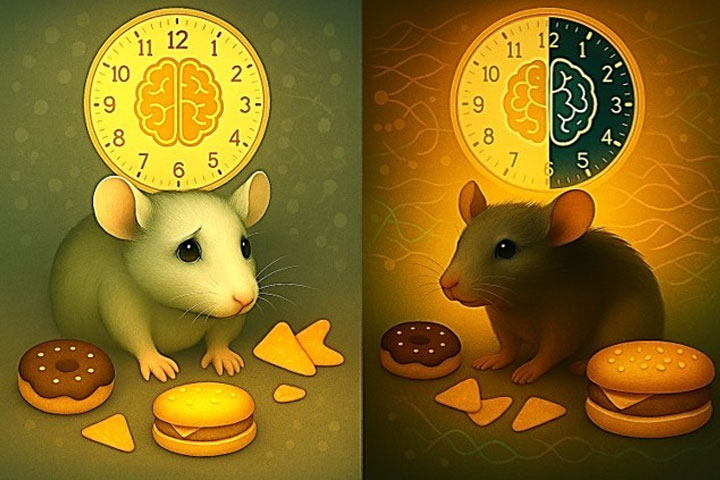
Time-Restricted Feeding Restores Brain and Metabolic Health in Obesogenic diet fed Mice
Consumption of obesogenic diet, high in fat and sugar (HFS), during adolescence is associated with memory impairments. Guillaume Ferreira from NutriNeuro lab has reproduced this condition in rodents and defined the type of memory affected as well as the neuronal networks involved. HFS diet consumption is also known to disrupt biological rhythms with misalignment of feeding to the light/dark cycles. The ANR project MAORI, led by Marie-Pierre Moisan from NutriNeuro, aimed to evaluate whether time-restricted feeding (TRF)—limiting food intake to defined daily windows without calorie restriction—can mitigate or reverse the negative effects of an HFS diet on metabolism, brain and memory functions in mice. The project consortium attempted to identify the neural mechanisms, at molecular, cellular, network and behavioural levels, impaired by ad libitum consumption of HFS diet and prevented by TRF. Two articles have been published recently on the topic:
The first study by Helbling JC et al. was published in Molecular Metabolism end of 2024. It showed that in male mice fed HFS diet for 3 months starting at weaning, TRF during the last month restored rhythmicity in metabolic parameters and prevented memory impairments, regardless of body fat levels. Molecular analyses in the hippocampus using pS6-TRAP RNA sequencing to detect mRNA expression from activated cells, revealed that the HFS diet disrupted thyroid hormone signaling and astrocytic gene expression related to glutamate neurotransmission. TRF restored the rhythmic expression of these genes in the hippocampus. Notably, infusing T3 (the active form of thyroid hormones) into the hippocampus reversed memory deficits in ad libitum HFS diet-fed mice, underscoring the pivotal role of thyroid signaling in linking nutrition, hippocampal-dependent memory function, and circadian rhythms.
Using the same mouse model of early consumption of HFS diet and TRF intervention, we analysed brain plasticity through the dynamics of dendritic spines thanks to our collaborator Freddy Jeanneteau from IGF in Montpellier, France. The study by Chakraborty et al. was published in eBioMedicine in July 2025. In both male and female mice, ad libitum access to HFS diet led to impaired memory associated with changes of cortical and hippocampal dendritic spines dynamics and neuronal activity in opposite direction: increased spines and neuronal activity in the hippocampus and decreased spines and neuronal activity in parietal cortex. TRF induced a dynamic remodeling of these dendritic spines and neuronal activity abnormalities and restored memory performance. Moreover, opposite chemogenetic manipulation of hippocampal and cortical activity, either in isolation or simultaneously, reversed memory deficits in HFS diet-fed mice. Finally, this study identified glucocorticoid signaling as a driver of the brain changes under ad libitum HFS feeding.
See article on CNRS Biology (in french): https://www.cnrs.fr/endirectdeslabos/Lettre.aspx
Together, these studies highlight time-restricted feeding (TRF) as a powerful “natural” intervention to counteract the metabolic and brain consequences of early exposure to an obesogenic diet. Furthermore, our results open new avenues for therapeutic strategies targeting thyroid and glucocorticoid pathways.
Helbling JC, Ginieis R, Mortessagne P, Ruiz-Gayo M, Bakoyiannis I, Ducourneau EG, Ciocca D, Bouleté IM, Favereaux A, Ces A, Montalban E, Capuron L, Jeanneteau F, Ferreira G, Challet E, Moisan MP.
Time-restricted feeding prevents memory impairments induced by obesogenic diet consumption, via hippocampal thyroid hormone signaling.
Molecular Metabolism. 2024 Dec; 90:102061.
doi: https://doi.org/10.1016/j.molmet.2024.102061
Chakraborty P, Dromard Y., André EM, Dedin M, Arango-Lievano M, Raner A, Besnard A, Santos Silva T, Helbling JC, Ferreira G, Challet E, Moisan MP, Jeanneteau F.
Meal scheduling corrects obesogenic diet induced-uncoupling of cortico-hippocampal activities supporting memory.
eBioMedicine 2025;117: 105783
doi: https://doi.org/10. 1016/j.ebiom.2025. 105783
Last update 27/08/25
